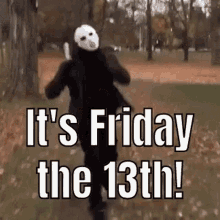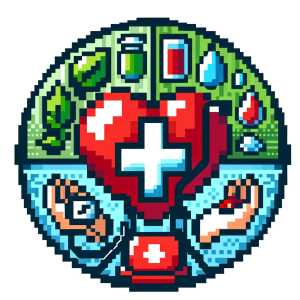
Is Friday the 13th Really More Dangerous?
Friday the 13th—a date that strikes fear into the hearts of many—has long been associated with bad luck. Superstitions have surrounded this day for centuries, and for some, it’s considered so unlucky that they go out of their way to avoid certain activities altogether.

But what if we told you that the myths about Friday the 13th, particularly regarding health and safety, don’t hold up under scrutiny? An older* study tackled this topic head-on and examined whether this notorious day actually saw an increase in emergency department (ED) visits.
Spoiler alert: It doesn’t.
The Study that Debunked the Myth
In an article published in the American Journal of Emergency Medicine, a group of researchers from Eastern Virginia Medical School set out to test whether Friday the 13th leads to higher hospital admissions or a spike in ED visits. The research team, led by Dr. Bruce Lo, used a retrospective chart review to analyze emergency room visits over seven years, spanning six hospital-based emergency departments. They evaluated a total of 49,094 patient encounters, comparing ED activity on Friday the 13th to the Friday before, the Friday after, and the month before and after.
Surprisingly—or perhaps unsurprisingly, depending on your level of superstition—the data showed no significant increase in ED visits on Friday the 13th. In fact, on some occasions, there were fewer visits compared to the surrounding days and months.
So, does Friday the 13th really deserve its reputation as an unlucky day? Let’s break down the findings and explore why these results matter, especially for public health professionals.
Superstition vs. Science: What Did the Data Reveal?
To investigate the myth, the study team looked at 13 different categories of health conditions, including everything from acute coronary syndrome to animal bites and psychiatric visits. These categories were chosen to cover a broad spectrum of emergency situations, giving the researchers a comprehensive view of hospital activity on Friday the 13th.
After crunching the numbers, they found that in nearly every category, there was no increase in ED visits on this supposedly cursed day. The only exception was an uptick in cases of penetrating trauma (think knife or gunshot wounds), which saw a slight increase on Friday the 13th compared to other days. However, even this spike wasn’t enough to warrant widespread panic.
For public health professionals and emergency service providers, this is significant. The fear surrounding Friday the 13th can lead to anxiety, changes in behavior, and even lost productivity, but the data show that there’s no need to treat this day any differently than any other Friday. Emergency departments won’t be overrun, and most people can carry on their normal activities without fear of some cosmic disaster befalling them.
What About Other Superstitions?
The study recognizes that other beliefs, such as the idea that a full moon causes an increase in hospital visits, have undergone extensive research. While some studies have suggested a correlation between a full moon and specific medical incidents like animal bites or seizures, the majority of the evidence debunks these superstitions as well.
In the case of Friday the 13th, the researchers suggest that any perceived increase in danger is more likely due to psychological factors than actual risks. The anticipation of something bad happening on Friday the 13th could explain why fewer emergency visits were recorded on some Fridays the 13th compared to other days, as people may act more cautiously or choose to stay home.It’s an example of how our beliefs and behaviors can sometimes influence the world around us, even when there’s no real danger present.
Why Does This Matter for Public Health?
This study may seem lighthearted, but it has real implications for public health practitioners. Superstitions like those surrounding Friday the 13th can influence behavior in ways that affect health and safety. For example, fear of the date might lead some individuals to avoid routine medical appointments or delay seeking care for fear that something might go wrong. On the flip side, people might also be unnecessarily anxious about their health on this day, leading to avoidable stress.
By dispelling myths like the one about Friday the 13th, public health professionals can help reduce unnecessary anxiety and promote rational decision-making. As we’ve seen with the ongoing fight against misinformation during the COVID-19 pandemic, it’s crucial to combat myths and ensure that people have access to evidence-based information. The more we can clear up superstitions and unfounded beliefs, the better equipped we’ll be to promote a healthier, more informed society.
The Role of Data in Demystifying Health Myths
One of the most exciting aspects of this study is how it exemplifies the power of data to debunk myths and shift public perception. For too long, many people have allowed superstitions to guide their actions, but as this research shows, data can provide a much-needed reality check.
For public health researchers, this is a reminder of the importance of using data to inform policy and practice. Whether it’s addressing misinformation about vaccines or tackling misconceptions about mental health, data can be a powerful tool for change. And in the case of Friday the 13th, the data are clear: there’s no reason to worry.
Join the Conversation
Do you or someone you know change your behavior on Friday the 13th because of superstitions? What other health myths or superstitions have you encountered in your work as a public health professional? We’d love to hear your thoughts! Share your experiences in the comments below or join the conversation on social media.
Be Part of the Change – Get Weekly Updates!
Stay informed and connected. Subscribe for free and share this blog to make a difference in public health with others. If you liked this blog, please share it! Your referrals help This Week in Public Health reach new readers.



